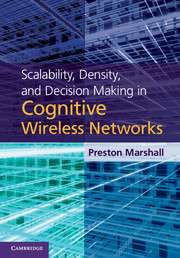Book contents
- Frontmatter
- Contents
- Preface
- Part I Overview
- 1 Introduction
- 2 Theoretical foundations
- 3 Future wireless operation, environments, and dynamic spectrum access
- 4 Some fundamental challenges in cognitive radio and wireless network systems
- Part II Generalized environmental characterization
- Part III System performance of cognitive wireless systems
- Part IV Integrated awareness and decision making
- Part V Summary
- Part VI Appendices
- Index
- References
2 - Theoretical foundations
from Part I - Overview
Published online by Cambridge University Press: 05 December 2012
- Frontmatter
- Contents
- Preface
- Part I Overview
- 1 Introduction
- 2 Theoretical foundations
- 3 Future wireless operation, environments, and dynamic spectrum access
- 4 Some fundamental challenges in cognitive radio and wireless network systems
- Part II Generalized environmental characterization
- Part III System performance of cognitive wireless systems
- Part IV Integrated awareness and decision making
- Part V Summary
- Part VI Appendices
- Index
- References
Summary
Introduction to theoretical considerations in wireless systems
This chapter is intended to provide a short summary of the relevant portions of each of the theories that are considered to be fundamental to the development of cognitive wireless systems. Some introductory material on radio-frequency (RF) propagation and device operating constraints is also provided for those not familiar with the relevant device and communications physics. Only those aspects of each area that are utilized in the analysis in the latter chapters are included, so this material should not be considered as even an introduction to any of the four areas. In most cases, the results are stated, and the reader is referred to the references, or further reading, for their derivation, or for a more comprehensive and complete development of each field of study.
Decision theory in cognitive wireless systems
Role of decision theory
One of the principles that we wish to introduce to wireless networking is that nodes have no absolute or mandatory requirement to perform any sensing, protocol reporting, or content-storage requirements. Instead of performing these operations automatically, they are considered to be performed only if the node can justify performing the operation on the basis of the likely performance benefits it achieves, or the performance risks it avoids. Information theory expresses the probabilistic considerations.
Decision-theory literature generally partitions into “normative,” which addresses how rational decisions should be made, and “descriptive,” which describes how humans actually make decisions.
Information
- Type
- Chapter
- Information
- Publisher: Cambridge University PressPrint publication year: 2012
